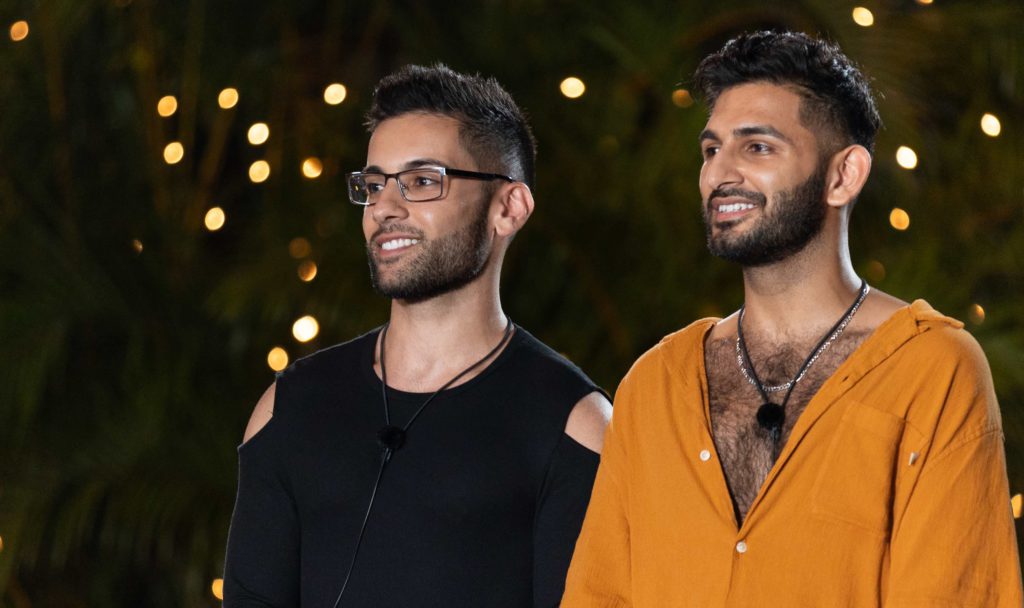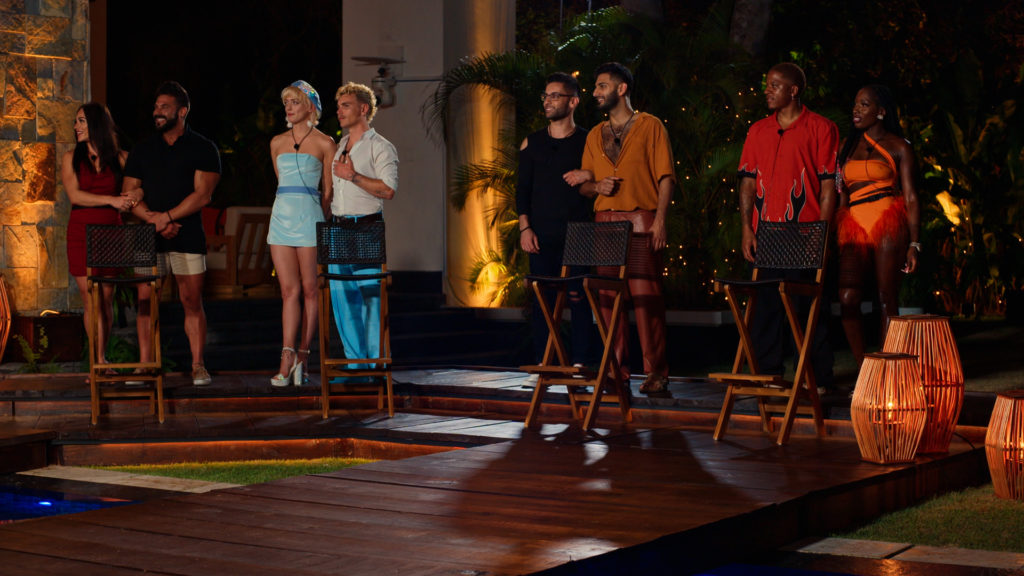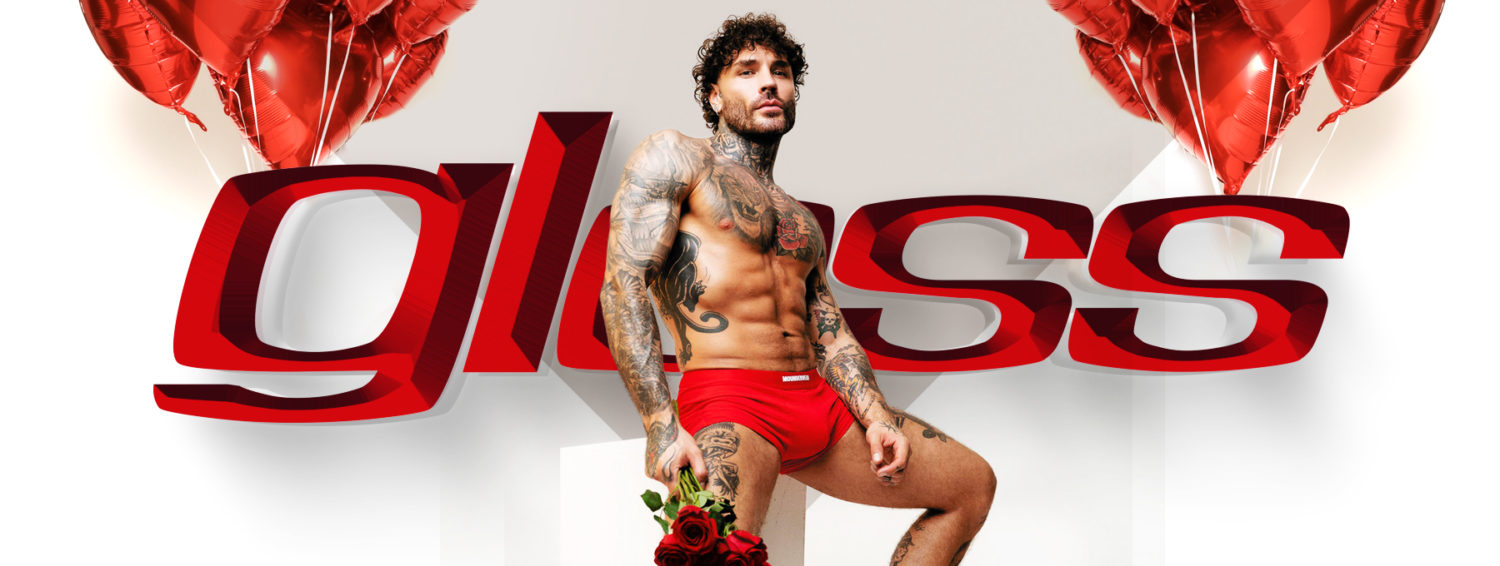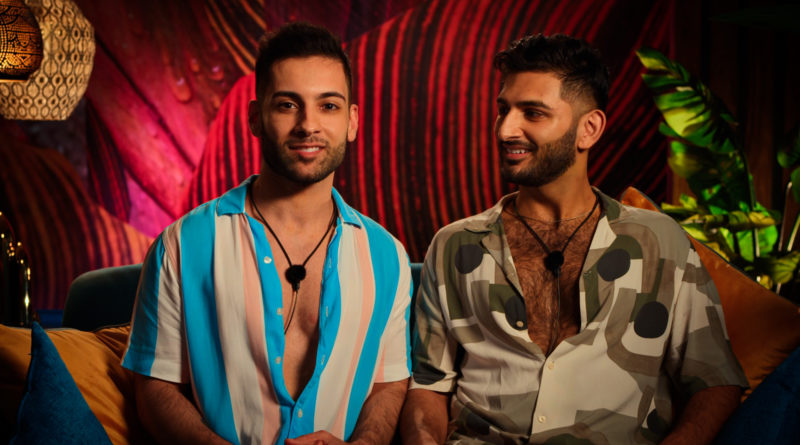Meet the Queer Twosome from Peacock’s ‘Couple to Throuple’ Show
Ashmal Ali and Rehman Bhatti are the only same-sex couple on the series
By Chris Azzopardi
Polyamory has officially reached the zeitgeist. Beyond the queer community, where it has, perhaps, lived more openly for some time now, it is represented prominently in a recent issue of New York magazine in a way that can speak to an even wider swath of the pro-monogamy population, thanks to the adorable four-cat polycule on its cover.
Polyamory has also reached executives at Peacock, who knew exactly what they were doing with the new reality series “Couple to Throuple,” which takes four twosomes and make them… moresomes. Enter Rehman Bhatti, who grew up 20 minutes south of Detroit, and Ashmal Ali, a Michigan State University law grad who’s originally from Atlanta. The two met while Ali was living in Lansing. “I was in Lansing, so I didn’t really experience Detroit as much,” he says. “I just didn’t really even have a reason to go until I met him.” Soon, they were spending time at places like Detroit’s Campus Martius skating rink and hanging out around Ferndale. Ali called Bhatti a “great tour guide.”
“When we first met, and before Ashmal thought it was going to be something serious, he didn’t refer to me by my name when he would talk to his friends,” Bhatti recalls. “He would refer to me as ‘Detroit Boy.’ He was about to save my name in his phone as ‘Detroit Boy’ instead of my real name. And then once it became serious, he’s like, ‘All right, we’ll drop that and we’ll call him by his name.’”
As of last year, the couple now both live in Chicago, though Bhatti says “Detroit is always where my heart is.”

How did you two get involved in this show?
Rehman Bhatti: I actually was scrolling Facebook one day and saw a Facebook ad for it, and it was just like, “Looking for couples that are open to experimenting and have an open mind about where they want to take their relationship.” So then I basically just applied, and then the next day I got a phone call that was like, “Hey, we want to do a quick phone interview.” And then after that, a week later, they were like, “Oh, we want to set you up with a video interview with our casting agents.” That’s when I let Ashmal know: “Hey, on this day we have an interview. Be ready because I signed us up for the show.”
Ashmal Ali: I was studying for my bar exam at the time so really that was my study break. I looked up, I showered, got a haircut, and here we are.
So it doesn’t sound like you had a lot of hesitation, Ashmal.
Ashmal: Oh, no. I mean, he said it’s a show for open-minded couples experiencing something new, and I was like, “We’re a new couple.”
Had you had conversations about polyamory before the conversation about being on the show?
Ashmal: I think to a certain extent, yeah. I mean, at that point we didn’t really have the words for what we were talking about. We didn’t have the terms like polyamory or anything like that, but we were talking about exploring. I think there was always a sense of, there’s so much this world has to offer, and I think we both had that mentality throughout our relationship so I think this was just a normal conversation for us.
What surprised you most about the experience?
Ashmal: How hot it was. Honestly, it was so warm. I’ve never sweat like that I think my whole life. I think, because you don’t see people sweating on TV, I was like, “Is this going to translate?” I’m dripping, I had tinted moisturizer on. I was like, “Is this coming off?”
Rehman: I did not realize that it was going to be as much of an emotional journey as it was. Looking back on it, I’m so glad that I just went through the experiment with a very open mind and participated. I don’t know if you agree, Ashmal, but I think we initially thought we were going to go there, have fun, and then when we found out it was serious about our relationship, we really took it as seriously as possible and that was definitely surprising to me.
Had either of you been in front of a camera before like that, especially for those confessional moments?
Rehman: No, first time for me.
Ashmal: Never a camera like that, and I think it was actually the second day when the camera became so real. I remember looking over and I was like, “There it is. There it is just staring at me.” And that’s when it became way more real. I think the first day we were just meeting everyone, it felt like meeting friends or meeting people for the first time; I was focusing more on that and then it became, “Oh wow, we are filming something.” There’s no script to follow, so we were just all figuring it out together, and I think that was cool about the experience.
What was it like to have that camera in your bedroom knowing that this would be on television?
Rehman: I was just like, “I hope they’re getting my right angles at all times,” that was basically it. [Laughs.] No, but seriously, you just totally forget about it, and you’re just so immersed in the experience and making new experiences with new people and all of that, that I just totally, at some point, forgot that we were filming a show.

So it was never on your mind what would be shown and what might not be shown on TV during those intimate moments?
Ashmal: I think after the first day, after the camera becomes real, you have to just remember that you’re a regular person and that you’re doing what regular people do. And it’s just, there happens to be a camera there. If you keep thinking about it, I think it not only affects you, but also the people you’re around. I never thought that I’d be exploited, so I think it was easy to let go and just focus on the experience. And it was the first time we could kind of focus on ourselves. We didn’t have to reply to emails, we didn’t have to worry about jobs, we didn’t have to do anything.
How did exploring polyamory on this show challenge your relationship and get you to think about relationships differently?
Rehman: I think because it was so new to us, we had never had prior communication about it. Let’s be honest, Ashmal and I have very interesting communication just naturally, so I think this added to that and made it even more difficult because our normal communication can sometimes be a little crazy, but now throwing in something that we don’t have very much experience with, we really had to take a step back and say, “Hey, we actually have to really talk about things, and we have to really be on the same page for the first time, in a very limited amount of time too.” We were only on the show for so many days and so many weeks, so we only had so much time to really talk about it, think about it, and then make decisions going forward. So it was definitely, I would say, a test for our communication, for sure.
After the show, are you still interested in pursuing polyamory?
Ashmal: I was open to whatever the world had to offer before, and I’m open to whatever the world has to offer after the show. I think it was just a great experience. Being open to things has been great so far. So yeah, I’m open to everything.
Rehman: One of the really cool things that I learned from the show is there isn’t necessarily one right way to be polyamorous. There’s so many different ways, and there are so many different ways that you could take your relationship. I think that’s the thing that Ashmal and I were so excited about: to explore how else we could have a relationship. Could we have something that’s not necessarily what people consider to be the norm? And that was the coolest thing for me to experience, seeing the other couples take on polyamory in a different way. So, a huge learning experience for me and I’m definitely open to what else comes in the future.
What was it like to be queer men in a group of seemingly mostly straight men?
Ashmal: For me, honestly, it was super fun. I think even on day one walking in, it made you forget whatever preconceived notions you might’ve had. I remember one person from one of the couples, Dylan Bair, a big muscular guy, I walked in and maybe I had my guard up for a sec. And then he opened his mouth, I was like, “This man is truly a teddy bear.”
Living in that house with everyone, you kind of forgot. It’s not that you forgot your differences, but you remember you were all here figuring this stuff out. So I was learning from Dylan. I mean, he would always work out, so I was copying his workouts. I just had the best time. It was like those barriers that we have in the real world were down. So you really got to meet these people for who they were and not necessarily what I would think they were if I saw them out.
Rehman: I think the one thing that made me a bit nervous coming into it being the only queer men was that, “Oh my god, people are now going to see us as the only [queer] people on there, that’s the only representation they’re getting; we have to make sure we’re dotting our i’s and crossing our t’s because we are going to be judged like crazy.” It took a little while for me to get over that and realize, listen, while I am somewhat representing the LGBTQ+ community, I’m representing Rehman and that’s it. So I really had to just go with the flow, do what I felt was right, and not necessarily worry about what other people are going to say or how I might be perceived by maybe non-queer people, but then also the queer community in general. I just had to do my own thing.

Why do you think more people seem to be openly talking about polyamory now?
Ashmal: For me growing up, exploring my queerness was already so out of the mold. It was already out of tradition. So it’s like just by being me, I’m already taking a step outside of what’s “normal.” Nothing else new feels like anything different because I’ve already stepped away from the tradition, so I’m way more open to everything else because I’m already doing something that’s not “normal.” We hold ourselves back less. And I think now heterosexual people are being more open to it because they’re not taking the traditional roles of male-female in a relationship.
Rehman: Some people are probably already practicing polyamory, and they’re just not maybe as open about it. I know we’ve talked to so many people when we’ve mentioned, “Hey, we’re going to be on the show,” and people have been like, “Oh yeah, I’ve tried that out myself.” And maybe they haven’t just been so public about it. I’m hoping that the more this topic and this way of having a relationship becomes more normalized, people will feel a lot more comfortable to talk about it, say publicly they’re in a polyamorous relationship, and feel a lot more comfortable to be themselves and try new things.
Chris Azzopardi is the Editorial Director of Pride Source Media Group and Q Syndicate, the national LGBTQ+ wire service. He has interviewed a multitude of superstars, including Cher, Meryl Streep, Mariah Carey and Beyoncé. His work has also appeared in The New York Times, Vanity Fair, GQ and Billboard. Reach him via Twitter @chrisazzopardi.

